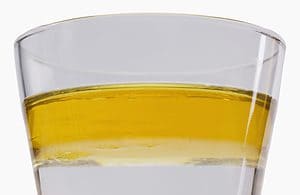If you are working with any kind of engine oil then it would be a very important query for you.
As most of the engine needs water or water types fluid such as coolant. So there is always a big chance of mixing water in the engine oil which might be harmful for the engine or equipment if the water in oil is significant level. So let’s discuss how to detect water in the oil.

Firstly you have to know the methods of how to detect water in oil. The most widely used method to detect water in oil is Karl Fischer (KF) which is generally done by ASTM D6304 method. The other methods are:
- Crackle test
- Calcium Hydride Oil Analysis
- Infrared Spectroscopy
- By Relative Humidity Sensors
Let’s discuss some common & easiest methods to detect water in oil:
Crackle test procedure:
If you ask, how to detect water in oil then you will see, that the answer is the crackle test method. It is the only easiest way to detect water in oil in a simple laboratory. In this method, water mixed with oil is placed on a hot plate. & then burn up to 400 F. Then if there is any water in the oil it becomes bubbles, crackles, or evaporates with sounds. The percentage of water has to be determined by visual inspection. It is the shortest and most effective method to detect water in oil. But if you want to find the accurate percentage of water or want to remove water from oil then it may not be perfect for you.
Pros:
- It is a very easy test to detect water in oil
- You can also remove water from the oil by the crackle test oil.
Cons:
- Accuracy is not possible in the crackle test, this is suitable for visualization of water in oil.
Infrared Spectroscopy:
In this procedure, measurement is done from the interaction of organic molecules. This interaction would be radiation, absorption, emission, or reflection.
How to detect water in oil by infrared spectroscopy:
In this method, you will get the exact measurement of water with the perfect detection from an oil sample. But it might not be cost-effective for you, as you need an IR spectrometer for this method. In this method, a small amount of sample has to be collected by syringe carefully & injected into an extractor. Then have to place this extractor into the spectrometer along with the card. After pressing the start button you will get the detected water amount with spectrographs within a very short time in the display or connected computer.
You can visualize the full process in the video appended below:
This is a very popular method for getting the Moisture content of oil determination or Oil in water ppm calculation. In a word, this is the only professional method for detecting water in oil or oil in water.
Pros:
- This process is so first.
- You will get the accurate data by this test.
- There is almost no physical activity needed in this test as it is mainly done by spectroscopy.
Cons:
The infrared Spectroscopy test is not cost-effective for detecting water in oil.
Karl Fischer method:
This is the most widely used method to detect water in oil or another compound. It is an analytical procedure to detect & quantify the amount of water content of any type of product or chemical. This process is done by titration of volumetric or coulometric application. The basic principle of this method is the oxidation reaction of iodine and sulfur dioxide.
Pros:
- It gives super-accurate results.
- Both qualitative & quantitative research is possible in Karl Fischer’s analysis.
- This test is a chemical reaction base test so Its cost is not beyond control.
Cros:
- Karl Fischer’s volumetric analysis sometimes gives marginal error & coulometric analysis is suitable for small samples only.
- Water detection is not possible from some chemicals like aldehyde, and ketone by KF analysis.
- Wastage of solvent due to manual titration in volumetric process.
Final World:
Hopefully, you have learned a lot about how to detect water in oil. Now you have to chosse your analysis according to your requirements. If it is for your query only then go for crackle test oil, but if it is for professional purpose you may go for IR or KF analysis.
